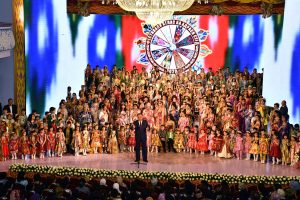On April 30, after weeks of strident denials the small Central Asian country of Tajikistan finally confirmed its first cases of COVID-19 — actually 15 of them in one fell swoop.
Tajik Prime Minister Kohir Rasulzoda made the announcement at an emergency meeting of the country’s coronavirus pandemic prevention committee confirming five cases in Dushanbe and an additional 10 in the northern city of Khujand.
The news comes two days after The Diplomat published a feature (reported by me) covering Dushanbe’s increasingly unbelievable denials. Not a single expert interviewed for the article believed Tajikistan had no cases of the novel coronavirus, which emerged in late 2019 in neighboring China.
Steve Swerdlow, a longtime human rights advocate and Central Asia expert, categorized the Tajik government’s responses as “cruel and inept at the same time.”
Dushanbe tried to elicit assistance from abroad at the same time it denied the active existence of the virus domestically. But the fiction could not last amid rising reports of hospitals filled with “pneumonia” patients and deaths attributed to the swine flu (H1N1) followed by swift burials by people in full protective suits. One of the latest deaths was of a high-level employee of the Dushanbe prosecutor’s office.
Last week, Tajik authorities began to issue orders for more strict preventative actions, including the closure of schools (but not universities) and banning of large gatherings (but leaving markets open). And over the weekend, the Tajik football league — which was among the few global sports outfits playing games — suspended its season through May 10.
Now, according to an AFP report, it will be mandatory for Tajiks to wear masks in public.
Tajik authorities did not release any further details about when the cases were discovered and the news, as Eurasianet highlighted, was delivered by Rasulzoda, a relatively minor figure in the constellation of Tajik political elites. Meanwhile, “President Emomai Rahmon… has not been seen in public since April 17, although he did deliver a televised speech on April 23 to extend holiday greetings to the public on the occasion of the start to Ramadan.”
The announcement of COVID-19 cases comes immediately ahead of a visit by a WHO team to the country.
Tajikistan may be now admitting that the virus is inside the house, but it remains the same government that issued denial after denial throughout April. It should not be forgotten that as its neighbors closed their borders and went into lockdown, cancelling large public Nowruz celebrations in late March in the interest of public health, Tajikistan’s President Emomali Rahmon celebrated on stage with crowds of women and children. As its neighbors reported their first deaths and growing numbers of infected, Tajikistan opened its football season and told its citizens not to worry.
The accuracy of the information the state now provides about its case load and efforts should be heavily scrutinized. Those numbers will now appear across countless tracking dashboards, and likely some of the focus on the country — as an outlier with shockingly no COVID-19 cases — will fade. But even if the spotlight moves on from Tajikistan, the reality is that Dushanbe is facing a massive public health crisis and has wasted nearly all its opportunities to get ahead.
Turkmenistan remains the last state in Central Asia, and one of the very few in the entire world, to be “officially” coronavirus free.
































